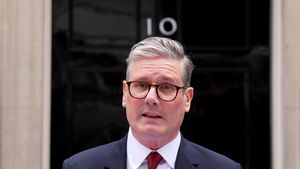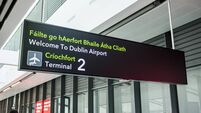Hugh Lynn believes you can’t beat a good election night

Newly elected Prime Minister Sir Keir Starmer gives a speech at his official London residence at No 10 Downing Street for the first time after the Labour party won a landslide victory at the 2024 General Election.
God, you can’t beat a good election, can you? I was in my element last week watching the election coverage from our near neighbours. Once the polling stations closed, we got the exit poll, and in fairness, it wasn’t that far off.
We knew the Tories were in bother for weeks. We’re not really Tory fans here in Ireland, are we? Labour is more the Irish cup of tea, I think, and the number of Irish people who are members of the Labour Party there is also quite high.
One of the most notable quirks of a British election count begins with the sound of runners squeaking on a sports hall’s varnished floor, balls and rackets are nowhere to be seen because the activity is a lot different to the usual fare. It’s part of the race to be the UK’s fastest election count – where ballot boxes filled with thousands of votes are opened, counted, and collated before the result is declared less than 90 minutes after the last vote was cast. The record, set in Sunderland nearly two decades ago, stands at 42 minutes and 45 seconds.
There’s something highly entertaining about watching young people in count centres running like the clappers with a ballot box in their arms on route to a counting table. Sometimes we see the boxes being thrown from person to person or passed along in a chain, but the sprinting is the method that always amuses me. For the record, the first constituency to declare in Britain this year was Houghton and Sunderland South at a quarter past eleven that night, 75 minutes after the polls had closed.
Their system is very different to ours, it’s a first-past-the-post method of running an election. So long as you get one vote more than the others, you’re elected. We saw some strange anomalies such as the Reform Party getting 14% of the vote and only four seats, while the Liberal Democrats got 12% of the vote and 71 seats. The Tory Party got 24% of the vote but just 121 seats. There are 650 seats in the British House of Commons. Sinn Féin won 0.7% of the vote and got seven seats (which they won’t sit on), while Plaid Cymru also got 0.7% of the vote and got four seats. All very strange, isn’t it?
In the North, we saw the defeat of Ian Óg Paisley, as my friends up there refer to him. That was a total shock for his party, the DUP. Here was the seat of his father lost after 54 years, North Antrim, considered the safest DUP constituency; Ian Óg had been a member of parliament for 14 years, and his father before him had been there since 1970..
As someone who works in Elphin, I keep a close eye on a Labour Party MP, Mike Kane, whose father left Lismacool outside Elphin in 1955. We follow each other on Twitter. His mother was from Ballinamore and left her home for Manchester also in 1955. Their son was elected to represent Wythenshawe and Sale East in Manchester in a by-election in 2014 and has retained the seat ever since. I’m watching to see if he might become a junior minister in Transport, Education, or even Northern Ireland. With so many Labour MPs elected, it’s a big ask.
Another Labour candidate on my radar was Claire Tighe, with strong Mayo connections. Tighe was born in Ealing but then raised in Ballina, where she went to school. Her father Martin and her late mother Ann, are from Ballycastle, and members of the Tighe family still live there. She had hoped to be the first Labour MP elected there since 1945, as well as the first female MP for the Spelthorne constituency in Surrey. She lost out to a Tory by 1,600 votes. She really performed well because the Tory majority at the previous election was 18,393.
This new British Government is going to be interesting and it should result in massive change. The first impact it may have on Ireland is that the appeal of Ireland as a destination for illegal immigrants might reduce, as Keir Starmer has stated that the British Rwanda project is now for the scrap heap. No longer is there a threat of deportation to Rwanda hanging over them.
I note that our government sees the Labour government as a positive development for Ireland, especially Northern Ireland. Starmer has no known Irish connections but has a deep interest in Ireland due to his five years working in Northern Ireland as a human rights advisor to the Northern Ireland Policing Board. He has said that he is planning to ease diplomatic tensions between the UK and Ireland, with implications for the Northern Ireland border and investigations into crimes committed during the Troubles. He has said that tensions between Dublin and London should never have become as strained as they were over Brexit.
He has promised to revisit the Troubles Legacy Act, which shut down historical investigations into crimes committed in Northern Ireland between 1966 and 1998. The Irish government has brought a legal challenge against the legislation. He has said he’s against it “because it doesn’t have the support of any of the political parties in Northern Ireland”. He also noted that the act doesn’t have the support of victims groups either.
Don’t be surprised if he’s in Croke Park next weekend for the Donegal Galway game; he’s been known to wear a Donegal GAA jersey while playing five-a-side football. Watch out for Donegal GAA Chair Mary Coughlan presenting him with a new Donegal jersey shortly!
A new broom in Britain, how clean will it sweep?






